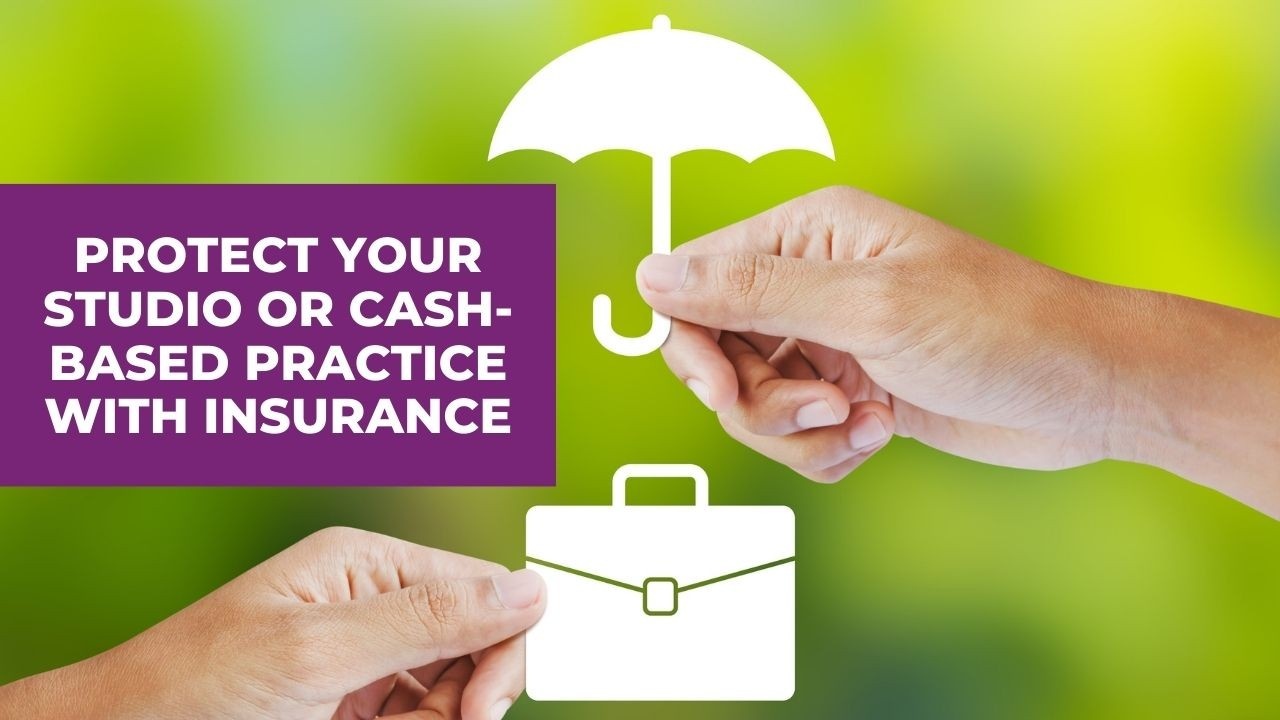Insurance for Studios & Gyms
May 04, 2021
Insurance...What You Need, What You Don't Need To Protect Your Business, Your Employees and Your Customers with Luis Gazitua.
When you start your business, you’re probably flying by the seat of your pants. I know I was. But I also knew that, as a Pilates studio owner who had various employees and clients coming in and out all the time, I needed to have insurance. My business, my team, and my clients needed to be protected. So I started talking to an insurance broker about the least sexy business topic: insurance.
That was about a decade ago, and Luis Gazitua is still my insurance broker. He also chatted with me recently to talk about insurance for studios, gyms, and cash-based practices. Keep reading to see what types of insurance you need and what insurance can do (and not do) for your business.
Who and what insurance can protect
The most important part about insurance, according to Luis, is to know what you want to protect. You can protect your entity (your business, whether you have an LLC, an s-corp, etc.), and you can protect the people.
When you have liability insurance for your business, it protects the entity. Essentially the studio, assets, and income of the business. This type of insurance may also cover employees, but that depends on the situation as well as your state. Luis always recommends talking to a licensed insurance broker in your area about your specific state’s requirements.
Of course, because liability insurance only covers the business, you also need to consider contractor insurance. If you hire contractors to help with your business, they should have their own insurance. If they don’t, you can request that they do so to keep working with you! This is important because, if a contractor is injured onsite or there’s an incident that leads to a lawsuit, the contractor isn’t personally covered. They’d be liable for any claims filed against them. Contractor insurance also protects your business, should a contractor get injured somewhere else or go off-site as part of their work with you.
The long and short of it? If a person is employed under your business entity, they’re covered and don’t need professional liability insurance. If they’re a contractor or work from themselves, they’re not covered and need their own insurance.
Insurance to protect against premise liability
One of the biggest fears that health and wellness business owners have is getting sued because someone got hurt on their premises. But as Luis explains, if someone does get hurt on your premises, they have to sue to get their claim covered. Often, this discourages people from making claims because the process is long and drawn out, as well as expensive.
However, there are a number of “clauses” in an insurance policy that help you take care of someone who has been legitimately injured on your property. For example, over at Pilates in the Grove, we have a $5,000 medical expense policy, to take care of smaller claims. However, we don’t just “pull from that fund.” In the event of a premise injury, we make sure to get the injury and the event in writing, go through our insurance agency, and work with our broker to get it all figured out.
How to understand your insurance policy
When I first started shopping for insurance, I got so overwhelmed. I didn’t know which policy was better, and I didn’t know what all the numbers meant. Luis explained it super clearly, though:
Each policy has two numbers: the payout per claim, and the total payout per year.
For example, if you have a $1 million/$2 million policy, that means you can receive claims up to $1 million each, and receive two payouts of that amount in a year. You can also receive claims less than $1 million per claim, but no more than $2 million in total for the year.
The other thing that Luis drew attention to is defense costs. With your policy, you’re only covered for the claim amounts — but that doesn’t include the costs associated with defending your claim. If you need to hire an attorney and pay court fees, those costs can add up. This can really eat into your business’s profits or revenue and make it harder for you to fight claims. To resolve that, Luis recommends a policy with higher coverages that include defense costs.
Ok, so what types of insurance do you really need?
Now that you’ve got a better understanding of why you need insurance and what you should be looking for when choosing policies, let’s talk about the types of insurance you need. Of course, this list depends on the type of business you have and where your clinic, studio, or offices are located.
However, Luis generally recommends:
- General liability insurance. This is in case someone were to sue you.
- Property damage insurance. This helps if someone breaks in, there is a fire in your building, etc.
- Inventory and contents insurance. This covers your suite/building, flooring, equipment, merch, etc.
- Workers’ compensation. This is legally required for 4 or more employees in Florida, but your state may have different rules.
- Employer practice liability insurance. This protects against claims from a job candidate or employee, over things like discrimination, sexual harrassment, etc.
- Business interruption/Loss of business income insurance. After COVID-19, this has been a big topic. Check your state’s laws and with an insurance broker, as there are a number of caveats and exclusions.
- Local insurance. If you live in an area where hurricanes, tornadoes, fires, floods, etc. are common, you should have specific insurance for those needs. Most general insurance and property insurance don’t cover all of the damages associated with weather events.
Don’t skimp on insurance
After over a decade growing my Pilates studios, there are two things I don’t skimp on: contracts and insurance. Luis also added that he wants health and wellness professionals to stop avoiding insurance brokers. While it may seem like someone is just “trying to sell you insurance,” or you may worry they’re giving you more expensive plans, that’s often not true.
Find an insurance broker you trust, and who knows your industry (like Luis!). They can often help you save money by choosing the right policies, and save your butt by making sure you’re covered. Best of all, you can contact your insurance provider when you have an incident, instead of wondering how to set a claim alone. You can call them with unprecedented issues like COVID-19 or if someone is threatening to sue, and they act as a live insurance support team member.
Insurance may sound like a pain in the butt, but it’s important to be proactive and really cover all the bases. You’ll sleep much better and have a much more successful (and stable) business when you do.
If you want to connect with Luis, you can reach him by phone to his direct number at the office 305-842-3592 — he serves nationally! You can also learn more about his company, JAG Insurance Group, by visiting their website.
Lorem ipsum dolor sit amet, consectetur adipiscing elit. Cras sed sapien quam. Sed dapibus est id enim facilisis, at posuere turpis adipiscing. Quisque sit amet dui dui.
Stay connected with news and updates!
Join our mailing list to receive the latest news and updates from our team.
Don't worry, your information will not be shared.
We hate SPAM. We will never sell your information, for any reason.


